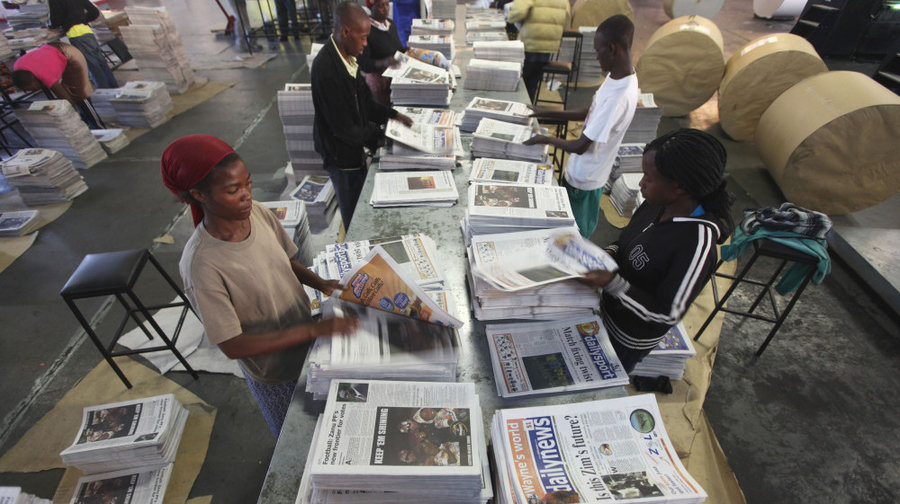The Southern African Editors Forum (Saef), which represents editors in the region, has rejected the Zimbabwean government’s proposals to come up with a new regulatory body for media controlled by the country’s Information minister Jenfan Muswere.
The editors said the proposed system merely amounts to statutory regulation initially envisaged under the infamous Access to information and Protection of Privacy Act (Aippa).
That regulatory proposal was widely rejected by the industry, media, journalists and various stakeholders.
“Saef notes with serious concern the Zimbabwe cabinet principles on the amendment of the Zimbabwe Media Commission Act and the proposed Media Practitioners Bill that are meant to effect media co-regulation and professionalise the media in Zimbabwe,” the regional editors’ forum said in a statement.
“The cabinet principles, if applied and enacted into law as announced, will further entrench statutory regulation of the media in Zimbabwe and smuggle back into law clauses from the repealed Aippa.
“Saef implores the Zimbabwe government to reconsider the proposed position in order to enhance press freedoms in the country and to ensure that the agreed co-regulation principle by government and the media sector is properly implemented.
“Under the recently announced cabinet principles, government indicated that it would set up a statutory Media Council of Zimbabwe (ZMC) to regulate media conduct.
“The cabinet principles are in direct contrast to the Media Alliance of Zimbabwe (Maz) and the Zimbabwe National Editors Forum (Zinef) position on co-regulation captured through a Maz statement released on 24 April, 2024 and a later statement released by the alliance in response to the cabinet principles.”
Government has announced that cabinet has approved more principles to amend the Zimbabwe Media Commission Act [Chapter 10:35], as presented by the Minister of Information, Publicity and Broadcasting Services.
It said the amendments will ensure that all identified gaps are covered.
According to the government, changes will also standardise training in journalism and mass communication, entrenching professionalism.
Furthermore, the definition of a media practitioner under the current environment will be expanded.
A new regulatory institution, MCM, will be established to regulate the media.
The principles also cover the ownership of mass media services in the country, tenure of office for commissioners of the regulatory body and
the reporting structure.
Foreign ownership of mass media services in Zimbabwe will be limited purportedly to promote local content, local business and employment.
The constitutional Zimbabwe Media Commission members will serve for a five-year term, which is renewable once.
Government claimed media representative organisations, journalists and stakeholders support the initiative.
Media associations and other stakeholders have rejected the official they agree with the new regulatory system proposal.
“Saef is in support of the view that the existing complaints handling mechanism and code of conduct are effective and industry-led and should therefore form the basis for any other structure that could emerge as a result of this law-making process,” the editors said.
“This is the same position of MAZ, which reaffirms in its position paper its commitment to selfregulation as the most democratic regulatory framework, but subscribes to the consensus position of co-regulation reached between government and media stakeholders.
“Saef supports the MAZ position on co-regulation in full and warns that proceeding with the cabinet principles in their current state will be against the co-regulation principles agreed to between the government and the media sector.
“Setting up of the statutory council will be bringing through the back door, re-packaging and resurrecting of the abhorred Aippa, repealed by the Zimbabwean government when the Second Republic came into office, and this will be against the government’s media reform principles.
Editors reminded the minister that the proposal to set the Zimbabwe Media Council was not new as it was envisaged under AIPPA 2012 and was roundly condemned and rejected by the media sector and ultimately it never saw light of day.
:It would be a tragedy for the government to seek to revive AIPPA through resuscitating
this ghost from the previous law.
“Saef urges the Zimbabwe government to undertake a broad consultative process that will involve media stakeholders, media civil society organisations and media regulatory bodies in order to reach a common position on the democratic implementation of co-regulation.”
The editors said a holistic and inclusive model anchored on co-regulation – which means an industry-led regulatory system supported by the government, especially on legislative arrangements, and other stakeholders – is evidently the best approach to ensure solid media freedom, ethical journalism and sustainability.
“For the current process to yield the desired results, there is need for clarity of concept, thought and implementation of the co-regulation model.
“Saef agrees with Zinef’s position that government should revisit the process to help regulate the media in a progressive – and not stifling – way as this maybe the case with the current cabinet proposals which do not represent the letter and spirit of the wide consultations by stakeholders.”
Newshawks













